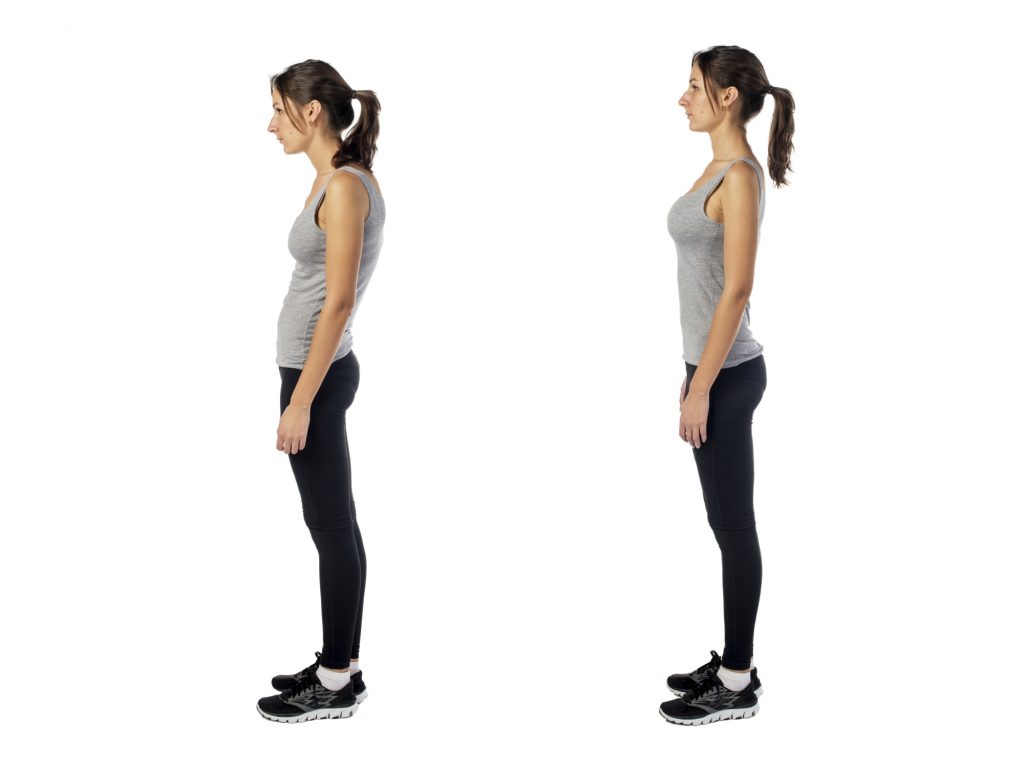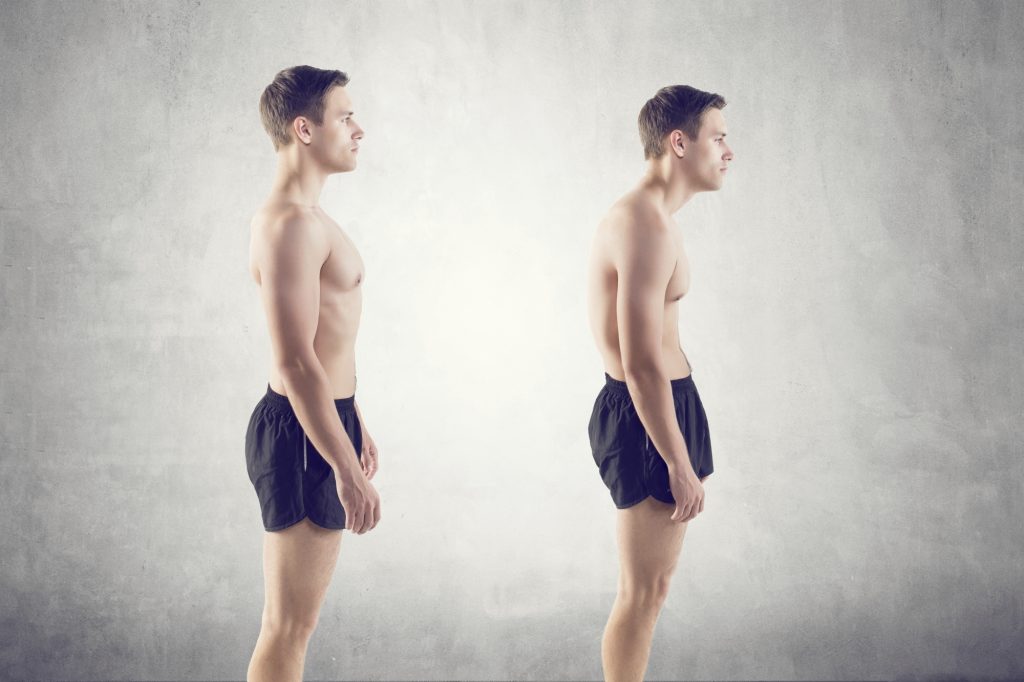Good posture is important for good health
The Importance of Good Posture
Good posture is an important contributing factor towards maintaining good health – along with healthy eating, getting enough sleep, exercise, having a positive, happy attitude and not abusing alcohol or drugs.
When you have good posture, your bones are aligned, your muscles, joints and ligaments can work as nature intended and no one structure within your body becomes overstressed.
When you have bad posture, your muscle and ligament imbalances can cause structures within your body to become stressed. Overactive muscles have to compensate for underactive muscles, which causes postural deviations. This can lead to many problems, including;
- Chronic pain in your back, neck or shoulders.
- Injuries to your joints.
- Injuries to your back, hips, knees or feet.
- Stiffness, aches and pains.
- Headaches.
- Tiredness and fatigue.
- Loss of muscle tone and muscle weakness.
- Breathing difficulties.
- Circulation problems.
- Digestion problems.
- Nerve and blood vessel impingement and compression.
- Sciatica.
- Carpal tunnel syndrome
These health consequences are why you should strive to improve your postural alignment towards normal. As a massage therapist I often see people who need help to relieve pain caused by these problems. Massage therapy can offer remedial help and pain relief, but it’s also important to work on correcting any postural problems that you may have at the same time, to achieve the best, long lasting results.
How do you know if you have good posture?
Good posture is when your body is in alignment. Good posture should feel easy and relaxed because it is your bones that are keeping you balanced and upright, not your muscles. Your spine is the foundation of health. Your body is designed to have your head, rib cage, and pelvis perfectly balanced upon one another. If your posture is deviated from normal, then the spine is also deviated from the normal healthy position.
At Zensations, if you visit for a remedial massage or a sports massage we will carry out a postural assessment before your treatment. Zensations uses a digital program which precisely pinpoints and measures your posture, producing an on the spot, instant postural report. This report highlights any misalignments or postural deviations that you may have. We can then work together on any imbalances using a combination of massage, postural awareness and exercise (to stretch tight muscles and strengthen weak / overstretched muscles). As we progress through this regime we can easily compare reports to assess any improvements in your posture.
At Zensations, our digital postural assessments, reports and exercise prescriptions are absolutely free! We take a holistic view of your health and wellbeing (treating you as a whole) – so, to receive the best and long lasting results from massage, we work together to correct any cause of pain as well as treat the symptoms of pain.
What does it feel like to have good posture?
Try standing with your back up against a wall, with your heels about 6” away from the wall. The back of your head, your shoulders and your bottom should be touching the wall. Now pull in your lower abdominal muscles to decrease the arch in your lower back. This is what good posture feels like! Try to maintain this alignment as you move away from the wall.
Benefits of good posture
- Improves body alignment: Your organs can function as nature intended.
- Eliminates pain: Your bones can easily support and balance your body weight, preventing your muscles, ligaments and tendons from having to support that same weight.
- Improves lung capacity & breathing: When you slump there is less room for your lungs to expand, which causes restrictions in breathing.
- You look taller, slimmer, younger and more confident.
- Improves your mental performance & concentration: Studies show that the increased testosterone and decreased cortisol (a stress hormone) that we produce from adopting an upright posture, boosts your ability to relax and focus on problems.
- Improves your mood: Studies show that when asked to recall memories, people with a slumped / slouched posture recalled more sad and depressing memories. Whilst people with an upright posture recalled more positive, happy memories.
- Improves digestion: When you have good posture, your digestive system and internal organs are in their natural position and not compressed, so normal digestion can flow and function properly.
- Improves circulation: When you have good posture, your circulatory system is allowed to progress in the way nature intended, with no interference from any compression or restriction, which could hinder your natural flow.
- A neutral healthy spine: When you have good posture, your body can function correctly without putting strain on your muscles, ligaments and tendons. Preventing the prospect of developing postural deviations, constricted or compressed nerves and blood vessels.
What causes bad posture? And how to prevent it
- Negative self image: If you are sad, ill, unconfident, submissive or lack motivation it will show in your posture.
A good posture portrays self-confidence. Your physical posture and body language affect you mentally and emotionally. Changing to a good upright posture portrays you as confident, powerful, trustworthy, proactive, open and honest to others. It also affects us in a similar way: studies have shown that when we assume a good upright posture it increases testosterone and decreases cortisol (a stress hormone) in our bodies within minutes. This helps us feel assertive, proactive and confident.
So keep your head up, shoulders back, chest up, eyes straight ahead and avoid pushing your head forward.
- Sitting improperly: This causes us to slouch, slump and hunch over.
Focus on keeping your ears and shoulders lined up and relaxed. Keep your shoulders back and don’t slouch or hunch over. Position feet flat on the floor, with your feet, knees, hips and elbows at 90 degree angles to your body. If you are having trouble maintaining this position, adjust your chair or desk until you achieve the correct posture. You could also use a neck pillow or back support to help maintain the correct position. Take a break every 30 minutes to move your body a little; walk around or stretch.
- Incorrect lifting: Lifting incorrectly can cause injury.
Assess the weight before lifting. When lifting heavy objects bend your knees (not your back), using the strength in your legs to lift the object. Keep the weight of the item as close to your body as possible. Keep your feet flat on the floor.
- Ill-fitting shoes and high heels: These throw your posture off balance and cause your muscles, ligaments and tendons to strain in order to support your weight.
Wear correctly fitting, comfortable shoes. If you have to wear high heeled shoes – try to wear them less often and keep a pair of flat, comfortable shoes available, for walking longer distances.
- Badly designed work environment: This can cause slumping, slouching, hunching over and bad posture.
When working, try to maintain good posture at all times; if it is possible – spend some time positioning your furniture, machinery, tools or work stations so that you are not bent over. After all, it is a health and safety concern. A good boss will recognise this and be proactive in promoting a healthy environment.
- Bad posture while doing housework: This can cause slumping, slouching, hunching over and bad posture.
When you’re vacuuming, ironing, dusting and cleaning always keep your posture in mind. Check yourself and ensure that you’re not hunching over or slouching.
- Avoid the mobile phone slump: Hunching over, looking down, while holding your phone by your stomach causes your head to tilt downwards 45 degrees; effectively exerting around 50 lbs of extra weight on your upper body, from the weight of your head alone. This causes your neck and shoulder muscles to contract in order to hold this position, generating pain in your shoulders and neck, your chest to sink down and your shoulders to rotate forward, resulting in a hunchback.
To avoid this, don’t look down at your phone – hold your phone at eye level instead.


























